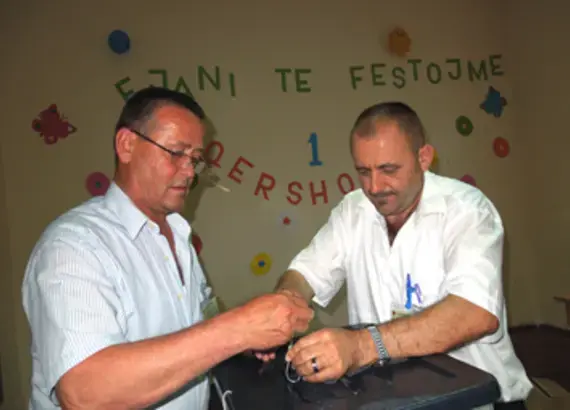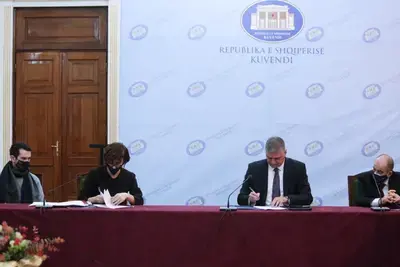
Success Story
Albanians Vote Resoundingly for Change in June Elections
After eight years with a government led by the Democratic Party (DP), Albanians voted resoundingly for change in elections on June 23. With counting completed on June 26, the leftist coalition Alliance for a European Albania, led by the Socialist Party (SP), scored a clear victory over the DP-led coalition Alliance for Employment, Welfare and Integration, winning 84 out of 140 seats. Voters will now be looking to the SP-led government to deliver on its campaign promises in the face of an increased demand for accountable and responsive government.
In his victory speech, SP leader Edi Rama thanked the voters and pledged to cooperate with the Socialist Movement for Integration (SMI) and other smaller parties. On the evening of June 26, Prime Minister Sali Berisha conceded defeat and unexpectedly resigned as DP party leader, saying “rotation is vital to democracy.”
The left-wing coalition secured a majority of seats in 11 of Albania’s 12 districts, including districts that were long considered DP strongholds, such as Shkodra. The result largely breaks the traditional north/south division of Albanian politics, with the north supporting the right and the south supporting the left. The only district the DP-led coalition won was the small northern district of Kukes. The SP-led coalition is now poised to enter government with SP leader Edi Rama heavily favored to be Albania’s next prime minister. At 53.51 percent, voter turnout was higher than in past Albanian elections.
While the left has swept into government with a clear mandate, the SP increased its number of seats from 2009 by only one – from 65 to 66 – and its share of the popular vote by 0.7 percent. Voters, rather than embracing the SP as the alternative force for change, looked to smaller parties – primarily the SMI. The SMI, which was a junior governing coalition partner until forming a pre-election coalition with the SP in April, dramatically increased its seats in parliament from four to 16. With strong branch structures throughout the country and a reputation for aiding its supporters, the SMI’s gains appear to come from increased support from an electorate primarily concerned with the state of the economy and employment plus the more favorable electoral math afforded by running as part of a coalition.
Smaller coalition parties, such as the Republican Party (RP) and the Party for Justice, Union and Integration (PDIU), also made incremental increases. The RP upped its share of seats from one to three and PDIU from one to four, with both of their leaders also winning separately on the DP ticket. Some speculate the increase may be attributed to right-wing supporters switching their support from the DP. New parties – including former president Bamir Topi’s New Democratic Spirit (NDS) and the nationalistic Red and Black Alliance (RBA) – failed to secure representation in the parliament. Independent candidates Arben Malaj, a former SP member of parliament running in Vlora, and Dritan Prifti, a former SMI minister running in Durres, also failed to secure seats.
Reflecting NDI’s 2012 focus group findings, economic issues, primarily related to job creation and tax policy, were the top priorities of citizens during the campaign. The result clearly revealed voters’ frustrations with Albania’s high unemployment rate and poor social services. Interlocutors with whom NDI spoke described these elections as a triumph of the Albanian public and a distinct sign that voters finally recognize the power of their vote to affect change.
One police officer and self-described DP-supporter told NDI he was happy with the elections, calling them “a true reflection of the people’s will,” encapsulating the frustration felt by many Albanians with the numerous controversial and disputed elections of the last 20 years. Election day proceeded with relative order, and the counting process, though suffering from delays primarily to allow election administration officials to rest, appeared to be executed in a diligent and methodical manner at most centers visited by NDI analysts. Though the analysts directly observed a few chaotic voting and counting centers, these problems were episodic and did not reflect the overall peaceful comportment of the elections.
Numerous interlocutors with whom NDI analysts spoke during election day and the days following – including commissioners, ballot counters, party observers, police officers, and the general public – were keen to gauge the international community’s assessment of the elections in hopes that the visible pride they felt in the smooth and peaceful process was reflected in the eyes of the international community.
NDI election analysts, accredited by the Albanian authorities as international observers and covering battleground areas north and south of Tirana, reported peaceful and orderly voting throughout election day. The NDI analysts traveled to approximately one dozen communities and visited approximately 50 polling stations and ballot counting centers in the districts of Durres, Fier and Lezhe, in addition to central Tirana. One analyst tracked events at the Central Election Commission.
NDI’s Albanian partner, the Coalition for Free and Fair Elections (CFFE), which also reported peaceful voting, dispatched 350 trained, nonpartisan citizen observers throughout the Tirana election district—the country’s largest—to a random, representative sample of polling stations. Their observations could be extrapolated to present an overall picture of election-day activity in the district.
Read more:
Published June 24, 2013
Updated June 28, 2013


